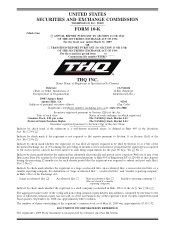THQ 2009 Annual Report Download - page 10
Download and view the complete annual report
Please find page 10 of the 2009 THQ annual report below. You can navigate through the pages in the report by either clicking on the pages listed below, or by using the keyword search tool below to find specific information within the annual report.a March 2008 study conducted by NPD, an independent provider of consumer and retail market research
for video games and other industries. According to the International Development Group, Inc. (‘‘IDG’’),
an independent consulting and advisory services company that analyzes the consumer electronics and
interactive entertainment industries, sales of console, handheld and PC games (excluding wireless) reached
$12.6 billion in North America, and $11.1 billion in Europe in calendar 2008.
The first modern video game platform was introduced by Nintendo in 1985. Advances in technology over
the past 24 years have resulted in continuous increases in the processing power of the chips that power
both the consoles and PC. Today’s video game consoles—the Sony PlayStation 3, Microsoft Xbox 360 and
Nintendo Wii—are not simply gaming platforms, but also function as multimedia hubs that can deliver
high-quality digital movies and television programs. Video games are also played on personal computers
that contain powerful graphics cards, and on advanced handheld devices such as PSP (PlayStation
Portable) and Nintendo DS. Additionally, both online gaming and wireless gaming have become popular
platforms for video game players over the last several years.
Our Products
We develop, market and sell video games and other interactive software and content for play on console
platforms, handheld platforms, mobile devices, PCs and online. The following games generated 10% or
more of our sales during the fiscal years ended March 31, 2009, 2008 and 2007:
• in fiscal 2009, WWE SmackDown vs. Raw 2009, Saints Row 2, and Wall-E;
• in fiscal 2008, WWE SmackDown vs. Raw 2008 and Ratatouille;
• in fiscal 2007, Cars and WWE SmackDown vs. Raw 2007.
Our games are based on intellectual property that is either wholly-owned by us or licensed from third
parties. We develop our games using both internal development resources and external development
resources working for us pursuant to contractual agreements. Whether a game is developed internally or
externally, upon completion of development we extensively play-test each game, and if required, send the
game to the manufacturer for its review and approval. Other than games we release for PCs or wireless
devices, the console manufacturers or their authorized vendors manufacture our products for us. We then
market and distribute our games for sale throughout the world.
Creating and Acquiring Our Intellectual Property
Our business process begins with an idea. Inspiration for our interactive entertainment software comes
from many sources—from our internal studios, from our external studio partners, or from existing
intellectual properties that we either license or acquire. Historically, most of our titles have been based
upon licensed properties that have attained a high level of consumer recognition or acceptance. We have
relationships with many well-known licensors and create games based on certain properties they own or
control. Licensors generally do not grant exclusive output agreements for all of their properties with any
3























